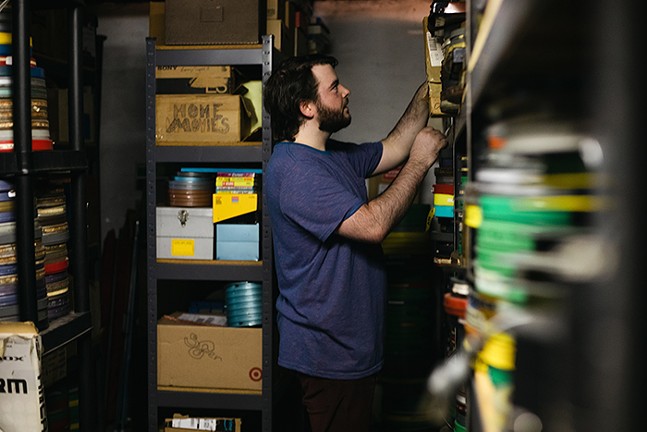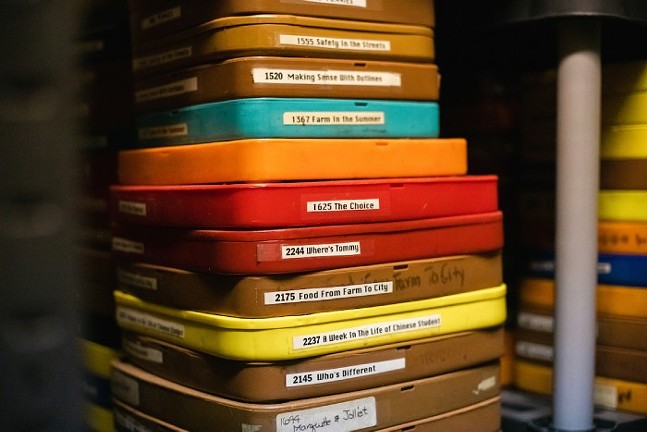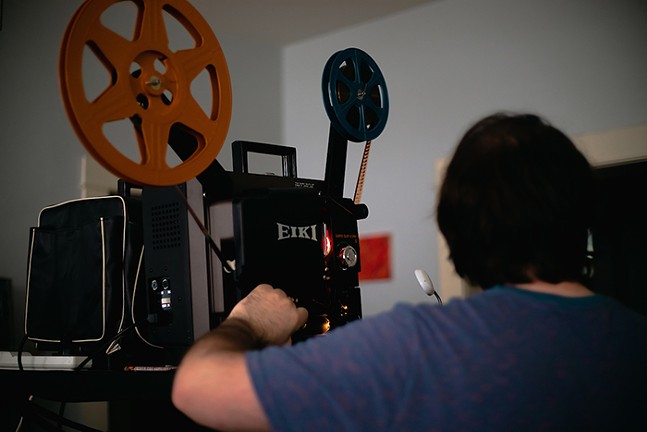What does the future of film in Pittsburgh look like? The answer might be found in a local basement where, earlier this summer, a crowd of people gathered to see films made decades ago and learn about the history behind them. The screening was the product of a new organization that hopes to shape the region’s future of film by shining a light on what came before.
I was running late as I walked down the stairs to meet the group at Eberle Studios, a gallery and studio space in Homestead — a critical mistake because, when I entered the space below, it was packed with people already sitting expectantly. The event organizers were running around trying to corral more chairs from somewhere else in the studio, while a projector stood at the back of the space facing a blank wall.
What we were waiting for was a program of educational films, something that on its face sounds unsexy, dull, and didactic. And yet they were anything but. The films in question were made by two important and often forgotten 1970s American female directors: Barbara Loden and Joan Micklin Silver. The program started, with the 16mm film lending the screen a hummingbird-like flicker.
It’s difficult to describe the films as a unit — Micklin Silver’s were funny and gently eclectic, while Loden’s tended towards stillness and quiet observation. The last film, Loden’s The Boy Who Loved Deer, a depressing coming-of-age story, left me so devastated I worried for the psyches of those who watched it as kids in the seventies.
The screening was put on by Pittsburgh Sound + Image, a local nonprofit dedicated to preserving, showcasing, and celebrating films, founded in the past year by Steve Felix and Steven Haines. Felix is the organization’s executive director, while Haines is the director of programming. The two met while volunteering for the Three Rivers Film Festival at the dearly departed Regent Square Theater — one casualty of the dissolution of Pittsburgh Filmmakers, a crushing blow to Pittsburgh’s film scene.
It’s impossible to talk about the work Pittsburgh Sound + Image is doing without first briefly describing the history of Pittsburgh’s film scene.
The Steel City played a huge role in the history of American experimental filmmaking during the 1970s, and one reason for this was the major influence of Carnegie Museums curator Sally Dixon, who founded the Carnegie Museum of Art’s film department. Dixon insisted that the new program pay visiting filmmakers well for their work, something that drew many of them here, including Stan Brakhage, Jonas Mekas, and Yvonne Rainier. She managed to secure generous funding — something more readily available pre-Reagan — through her connections to cultural venues, both at local and national levels. Her ability to facilitate financial support was crucial in the creation of the small filmmaking equipment center that would, in 1972, become Pittsburgh Filmmakers.
Filmmakers was, at one point, one of the largest and most influential media centers in the country. Not only did it operate three theaters devoted to arthouse films — Downtown’s Harris Theater (now operated by the Pittsburgh Cultural Trust), Melwood Screening room in Oakland, and the Regent Square Theater — but it also provided resources for local filmmakers through classes and access to equipment. Haines, who has lived in the city for over 10 years, was heavily involved in Pittsburgh Filmmakers.
“It was an important community for me,” Haines says. “I was taking classes there, seeing tons of movies, was even the chair of their artists’ committee at one point. So I had a front-row seat for its last few years. It was really heartbreaking.”
Filmmakers attempted to survive via a 2005 merge with the Pittsburgh Center for the Arts, and the two organizations later pledged to "return to Filmmakers' roots" in January 2019 when they rebranded as Pittsburgh Center for Arts & Media. But financial trouble caused them to lay off the majority of its staff and close its two remaining theaters.
When Filmmakers closed, Haines took it upon himself to store the “1,500 reels of Allegheny Intermediate Unit films” housed under the stairs in their Oakland building. “They’re in my basement because nobody else wanted them,” he says.
Finding and handling film prints is a lot of what Haines does; prior to founding Sound + Image, Haines consolidated his individual archival and programming work under the moniker Flea Market Films, a nod to the way he’s found many of the prints in his collection. He’s become well known in Pittsburgh’s film community for this work.
“People in Pittsburgh know me,” he says. “I'm one of the film people, so people contact me when they have films or find them.” Felix, one of the people familiar with Haines’ Flea Market Films work, reached out after their initial meeting at the Regent Square Theater, saying, “I DM’d him on Twitter and said ‘happy to help with anything you're working on.’”
The pair started out with Pittsburgh Cinema Planner, a website and newsletter dedicated to providing comprehensive film listings for the area. In May, they officially began a screening series hosted at Eberle Studios — all on real film prints. Over the past few months, they’ve shown Jean Cocteau’s imagistic surrealist film The Blood of a Poet, a rare print of filmmaker Shirley Clarke’s fluid and jazz-inflected The Cool World, and the aforementioned program of educational shorts.
Neither Felix nor Haines picture the work they’re doing as a direct replacement for Filmmakers.
“I think it'll take several new organizations to fill the shoes of Filmmakers,” Haines says. “They did so many things … school, filmmaker services, two theaters.” At the same time, the two have clear goals in mind when it comes to Sound + Image’s future. “You know, we've got a couple of events under our belt now,” Haines adds. “We want to start upping the frequency a little bit. We have no shortage of things I'd like to see happen.”
Felix says they’d both like to have a dedicated space for full-time programming, closer to the archives in a safer and more accessible way. Haines expands on this idea, saying, “I think there's something really, really important about going to a place, a community. That's so much of what Filmmakers was, a physical place with people gathering, and a place with very specific facilities.”
There’s a tie-in here with Haines’ archival work, too. Haines has spent a lot of time uncovering Pittsburgh’s film history, and, as a result, he’s ended up talking to people who made films here long ago.
“There have been a number of people I've gotten in touch with to talk about their film work, maybe for the first time in decades or for the first time ever,” Haines says. “And, for a couple of them, then they've died. That’s the only time they really got to talk about their work.”
Some of those folks ended up giving him their films; “in several instances, people have explicitly said, ‘I can't care for these, you will care for them better than I can.’”
The absence of an organization like Filmmakers is, for Haines, particularly evident in these cases.
“There aren't really resources for people to handle them in Pittsburgh anymore,” he says. “So something I want to do is start to do some workshops, to teach people how to handle films and care for the films they have. I like the idea of maybe not a traditional archive, that's, like, ‘Give us your stuff!’ Instead, ‘We can teach you how to care for your stuff, and you're the best caretaker for it.’”
In the meantime, Haines carefully cares for his collection of prints in the basement of his Munhall home. He believes he has “somewhere in the thousands” in boxes and canisters, though he tells me he’s not sure of the exact amount.
This year, Pittsburgh Sound + Image was one of 61 organizations chosen by the National Film Preservation Foundation, receiving a grant to help preserve a film Haines found cleaning out the Regent Square Theater in 2019. (In typical Pittsburgh “small world” fashion, it was originally donated to Pittsburgh Filmmakers by David Newell, the actor who played Mr. McFeely on Mr. Rogers’ Neighborhood.)
Spang’s First Century, a previously unknown 1926 film, documents the first 100 years of Spang Chalfant & Co., an Etna-based iron and steel manufacturer that was, at one time, Carnegie’s competitor. It’s one of few existing films to capture factory life in Pittsburgh at the time, along with views of what the city looked like almost 100 years ago.
The September screening series will also draw from Pittsburgh’s rich filmmaking history. The program, “Avant-Garde in the Classroom,” will feature the work of local filmmaker Tippi Comden side-by-side with well-known filmmakers like Doris Chase, Robert Breer, and Norm McClaren. Comden, who died in 2010, worked at the Western PA School for the Deaf and ran the media department there.
“She taught the kids there to make films,” Haines explains. “When I found out about Tippi, I was so excited.” He’s even found a way to connect Comden with the other filmmakers in the program. Robert Breer — whose film Fuji is part of the line-up — came to Pittsburgh often, and ran filmmaking workshops that Comden ended up taking. “So I have a reel with films Tippi made in one of his workshops.”
Felix, who previously co-founded The Nightlight, a nonprofit arthouse theater in Akron, Ohio, says he hopes Pittsburgh Sound + Image can help push back on the Netflix and Disney-driven trend of erasing film history along with local culture and local labor. “Steven’s hands-on, locally, and historically deep approach is certainly a counter to that, whether or not it's part of his motive, too.”
When it comes to his hopes for the future of Pittsburgh’s film scene, Haines talks about what it was like in the past.
“Going to the movies, having the resources to make the movies and to screen them. There were people coming in from out of town constantly to share their work, and to make their own work,” he says. “It created a really vibrant scene for people here wanting to make and see stuff.”
It’s a vision of a potential artistic community, but one that he says is only found by remembering what came here before. Later, when asked why he does what he does, he says, “Maybe you noticed all the boxes I have with people's names on them. A lot of what I do is trying to remember and honor lives lived.”
Avant-Garde in the Classroom. Fri., Sept. 16. 8-10 p.m. Eberle Studios. 229 East Ninth Ave., Homestead. Free. tinyurl.com/AvantGardeClassroom
Pittsburgh Sound + Image’s Pittsburgh Cinema Planner. pghcinema.com




